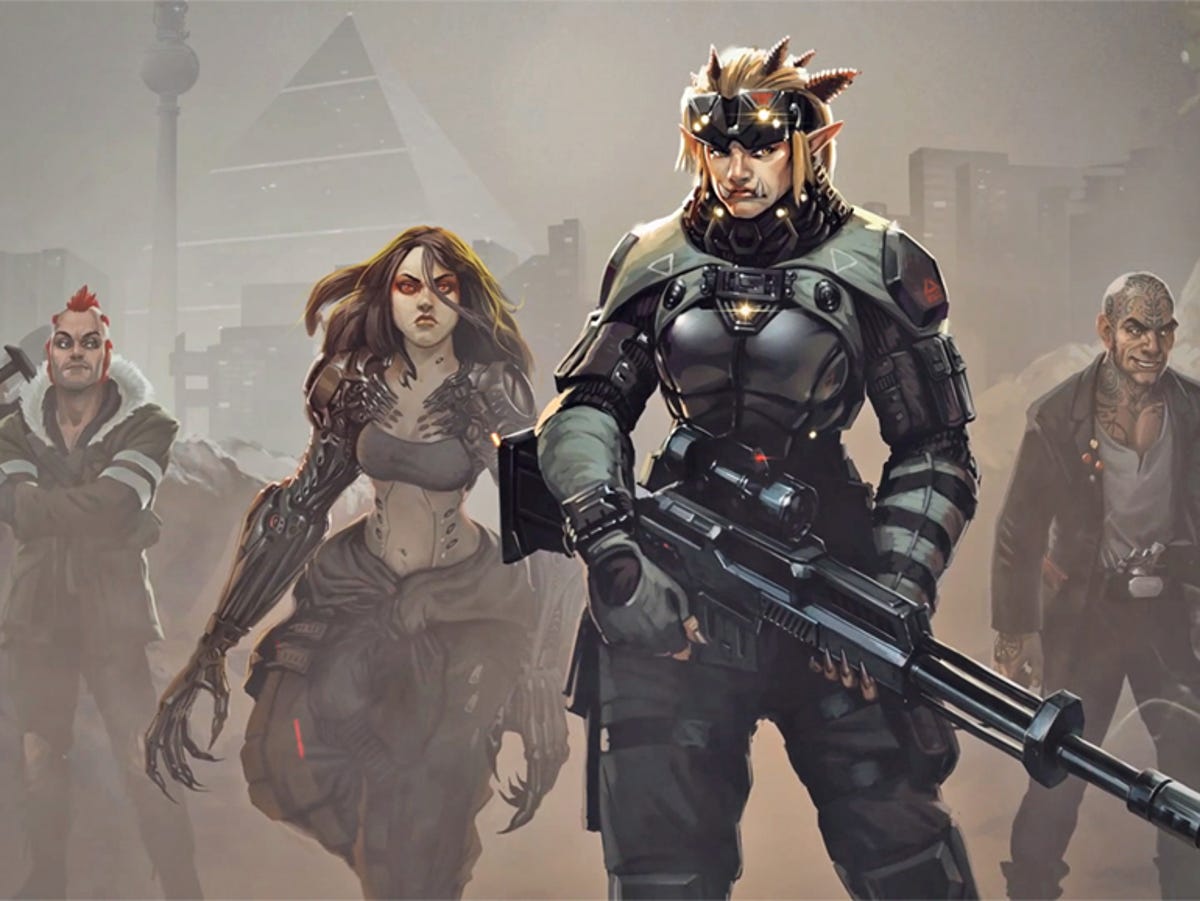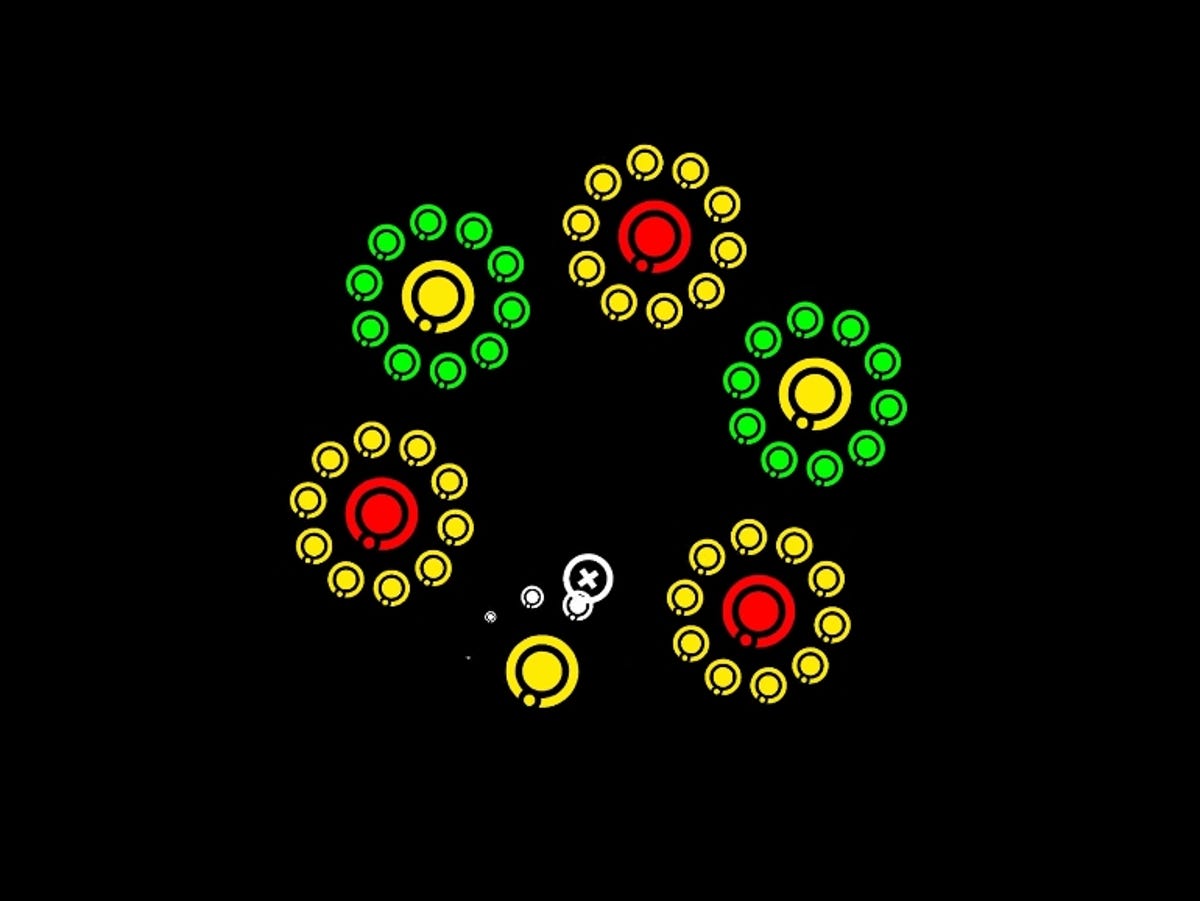
Shadowrun: Dragonfall
After a successful reboot funded by Kickstarter, cyberpunk tabletop RPG-cum-mobile game Shadowrun has returned for a sequel. Or rather, an expansion. Originally released as a free DLC expansion in February 2014 for the PC version of the game, Dragonfall is a stand-alone campaign that takes place in Berlin, Germany, based on the Shadowrun Germany sourcebook.
For the newly launched mobile version, the game has also added new features, including five new missions, new alternate endings, new music, team customisations, a redesigned UI and an overhauled combat system, making it one of the most polished RPGs available for mobile.
Price: $4.99 | AU$8.32 | £4.45 (Android); $4.99 | AU$6.49 | £3.99 (iOS)
Bean Dreams
In the three years since the launch of its first game, Bean's Quest, Australian studio Kumobius branched out with Time Surfer and the critically acclaimed Duet. Now the studio has returned to its little sombrero-wearing jumping bean in a retro side-scrolling platformer that perfectly captures the nostalgic feel of the 8-bit era in a colourful mobile experience.
Our eponymous hero, Bean, never stops jumping -- the aim of the game is to steer him left and right through the platform levels by holding each side of the screen, collecting the fruit and axolotls as you go while trying to make as few jumps as possible -- combining conceptual simplicity with some quite tricky levels in a colourful setting.
Platforms: iOS
Price: $2.99 | AU$3.79 | £2.29
Sol Invictus
Cubus Games has been publishing games for less than a year, but already its gamebooks are putting it on the map. Combining gorgeous art and audio with compelling soundtracks and innovative game systems, it's shaping up to be quite the library.
Sol Invictus -- the company's fourth publication -- is the sequel to acclaimed Heavy Metal Thunder, by science fiction author Kyle B. Stiff. The solar system -- and humanity -- are being crushed under the oppressive regime of the alien invaders. Yet is humanity's solution any better?
Also there is a character named is Wolf Tits. I just needed to address that elephant in the room.
Price: $1.12 | AU$0.99 | £0.99 (Android); $0.99 | AU$1.29 | £0.69 (iOS)
Syberia
Sometime this year, lovers of Benoît Sokal’s 2002 steampunk point-and-click adventure game Syberia will be getting a treat: Syberia III, penned by Sokal and published by Anuman interactive. And, just in time to get players amped up for a new chapter in the adventures of Kate Walker, Anuman has revamped and released the original Syberia on iOS and Android (this is also a different version from the previous version licensed and published on mobile by Big Fish Games).
Syberia II is on the way for iOS and Android as well, so keep your eyes peeled.
Price: $5.65 | AU$6.99 | £3.99 (Android); $4.99 | AU$6.49 | £3.99 (iOS)
Adventure Time Game Wizard
Last year saw the release of Pixel Press Floors, a Kickstarter-funded system that allows users to design their own side-scrolling platform games by drawing them by hand on sheets of special grid paper. Now the company has partnered with Cartoon Network for an Adventure Time-themed version.
As well as drawing the levels by hand, the game includes an in-game level creator so that you can take Finn and Jake on adventures battling the Doodle Wizard. It also includes an arcade where you can upload your own designs and play the designs of others.
Free, printable sheets and a starter kit are also available on the Adventure Time Game Wizard website (a fact that isn’t mentioned on either app store).
Although the gameplay isn't anything new, I absolutely adore the concept of crowdsourcing all the game’s levels -- of bringing players to a game they have made themselves.
Price: $4.99 | AU$6.07 | £3.29 (Android); $4.99 | AU$6.49 | £3.99 (iOS)
Murder in the Hotel Lisbon
Murder in the Hotel Lisbon takes its cues from LucasArts adventures of old, with its 256k pixel-painted aesthetic, its point-and-click murder mystery gameplay and its slick sense of humour. As Detective Case, you have to find the clues and sift through the contradictory evidence to prove that the man who died with 14 stab wounds in his back while drinking coffee was not, after all, a suicide.
Price: $2.82 | AU$3.62 | £1.95 (Android); $2.99 | AU$3.79 | £2.29 (iOS)
Wheel & Deal
Wheel & Deal is cops and robbers distilled down to top-down car chase mayhem. Basically, you’re on the run from the law, which is sending its units after you in force. Controls are simple: touching left and right steers the car and touching both sides brakes. You autofire to take down the cops so you can grab cash to upgrade your getaway vehicle, and it's all set to a pumping synth neon 80s vibe.
Platforms: iOS
Price: $1.99 | AU$2.49 | £1.49
The Witcher Battle Arena
The mobile marketplace has been positively blooming with MOBAs over the last few months and the latest to hit is none other than CD Projekt Red’s The Witcher (it seems all stops have been pulled from the franchise's mobile offerings).
It's been built specifically for mobile, and offers both single and multiplayer battle campaigns, so you can play offline if you want to. Heroes progress, opening up new ways to play as you improve; and to start with nine heroes are playable -- Geralt of Rivia, Letho of Gulet, Philippa Eilhart, Zoltan Chivay, Eithné of Brokilon, The Operator, Golem, Saskia of Aedirn and Iorveth -- with more coming soon.
Price: Free
Psych
Psych is one of those ridiculously frustrating twitchy arcade experiences that I love and hate (but mostly love) so much. The aim is to jump across shrinking concentric white blocks while avoiding the empty spaces as much as possible. That part is actually hard enough as it is, although you can get the hang of the timing after a few goes. However, as you progress, the stages will start to warp; maybe popping out into a sphere, or distorting into twisted shapes. It’s quite beautiful in a surreal sort of way.
Price: Free
Odd Bot Out
First things first: This game, for all its simple graphics somehow contrives to be utterly adorable.
As faulty robot Odd, dropped down into the recycling facility, you have to make your way out, using whatever tools are at your disposal. It’s put together brilliantly, and is the perfect puzzle game for the younger family members -- or the grown-ups who love adorable robots.
Price: Free (Android); $0.99 | AU$1.29 | £0.69 (iOS)
Skyward
Although Skyward has been heavily inspired by Monument Valley in terms of its visual aesthetic and Escher-esque level design, don’t let that fool you: The gameplay is actually very different. It’s based on timing rather than perspective.
The red and blue spots are like your "feet"; they orbit each other to "walk" across the structures, which fall apart behind you and construct themselves ahead. Where you come in is helping put the feet down: tapping stops the orbiting dot. The challenge is in stopping it when it's aligned with the building; drop it in space and you'll have to start over again. It's very well done.
Price: Free
Fahrenheit: Indigo Prophecy
There's no denying that David Cage's 2005 game Fahrenheit had its flaws. There's also no denying that it was the precursor to an entirely different style of gameplay -- point-and-click adventuring combined with quicktime events for a sort of interactive, multiple-viewpoint cross between a game experience and a cinematic one. Cage, of course, went on to make Heavy Rain and Beyond: Two Souls, which utilised the same gameplay mechanics to great effect and critical acclaim.
Fahrenheit is where it all began, and seeing it brought to life again through mobile -- with upgraded graphics, with a live graphics comparison, and newly designed touch controls is an absolute delight.
It's not a small game: You will need 6GB of space for it. Just be aware.
Platforms: iOS
Price: $9.99 | AU$12.99 | £7.99 (iOS)
Tales from the Borderlands
Speaking of David Cage, the style of gameplay pioneered in Fahrenheit is probably most widely recognised in Telltale Games, which has made its name with beautifully animated adventure titles punctuated with QTEs -- The Wolf Among Us, The Walking Dead, Game of Thrones -- and now popular FPS RPG Borderlands.
The game picks up where Borderlands 2 leaves off, a self-contained five-part tale set on Pandora, starring straight-laced Hyperion employee Rhys and Pandora-based con artist Fiona, both of whom are on either side of a shady deal that is bound to go pear-shaped. It'll probably contain a lot of references unfamiliar to those who haven't played Borderlands, but if you're a Telltale fan -- it's going to be worth a play anyway.
Price: $4.99 | AU$5.72 | £3.19 (Android); Price: $4.99 | AU$6.49 | £3.99 (iOS)
Heroes of Might & Magic III
The turn-based medieval strategy Heroes of Might & Magic franchise has been going strong for 20 years now, with the seventh game -- Might & Magic Heroes VII -- due sometime later this year.
One of the most popular editions in the entire franchise was 1999's Heroes of Might & Magic III, having smoothed out the gameplay kinks of the previous two titles, with seven campaigns that each tell a different facet of the game's story.
Ubisoft, which has held the license for the franchise since 2003, has given the game a graphical upgrade to HD and a touchscreen port to iOS and Android (tablets only), with pass-and-play multiplayer as well as online multiplayer and single player modes.
Price: $11.31 | AU$12.99 | £7.99 (Android); $9.99 | AU$12.99 | £7.99 (iOS)

Satellina
Satellina is a sweet, minimalist arcade game with one simple concept: Only collect the green particles.
You move your cursor around the screen with your finger, trying to grab the green particles in as short a time as possible to unlock the next level -- but the particles fly around in patterns, weaving in and out of each other, meaning the trick is to discern the patterns so as to time your particle collection just so. It's tricky, but manages to land in that sweet spot where it's ultimately deeply satisfying.
Price: $1.99 | AU$2.41 | £1.27 (Android); $1.99 | AU$2.49 | £1.49 (iOS)
Newly out for Android
Waiting for a particular game that got an iOS release a while ago? Here are our picks.
Crossy Road (Free)
N.O.V.A 3: Freedom Unite (Free)
Hearthstone (Free)
80 Days ($4.57 | AU$5.50 | £3.00)
KOTOR ($9.99 | AU$12.56 | £6.57)
GTA Chinatown Wars ($4.99 | $AU6.49 | £2.99)
Baldur's Gate II ($8.00 | AU$10.10 | £5.22)
Impossible Draw (Free)
Oddworld: Stranger's Wrath ($4.99 | AU$5.99 | £3.99)
Inferno 2 ($2.99 | AU$3.49 | £1.99)

